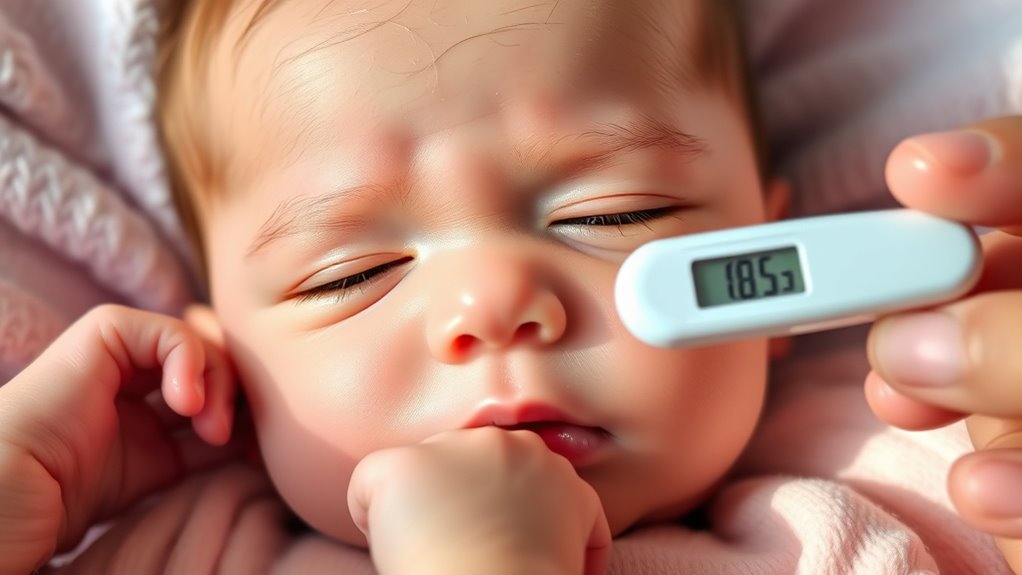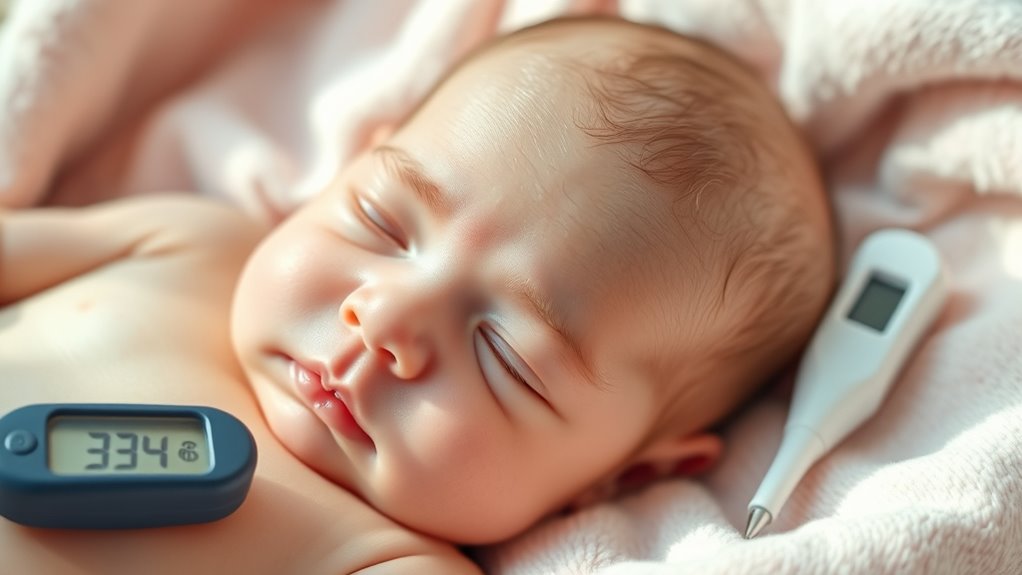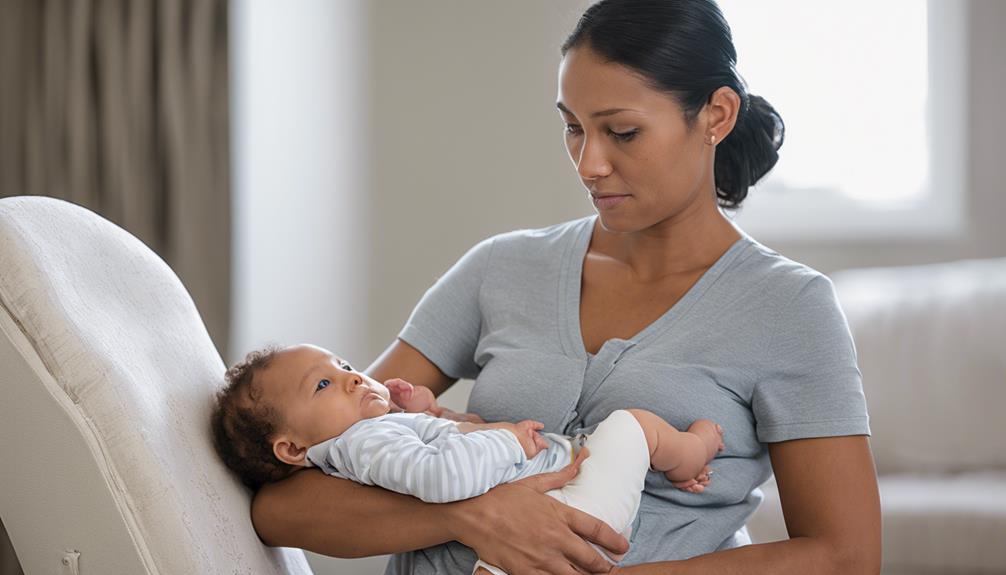Fever in babies is common during teething or after vaccines, but you should worry if it reaches 102°F (39°C), persists beyond a couple of days, or if your baby is unusually irritable, lethargic, or dehydrated. Watch for signs like difficulty breathing, seizures, or rash. Keep track of their behavior and use cool compresses or medication as advised by your pediatrician. To understand more about when to seek help and how to manage, keep exploring this important topic.
Key Takeaways
- Seek medical attention if your baby’s fever reaches 102°F (39°C) or higher.
- Watch for signs of dehydration, lethargy, difficulty breathing, seizures, or persistent fever.
- Fever caused by teething or vaccines is usually mild and short-lived, but monitor symptoms closely.
- Contact a pediatrician if your baby is unusually irritable, unresponsive, or shows worsening symptoms.
- Use cool compresses and age-appropriate medication, following pediatrician instructions, to manage discomfort.

Have you ever wondered what it means when your baby develops a fever? It’s a common concern for many parents, especially since babies can’t always tell you how they’re feeling. A fever in your little one can be caused by various factors, including teething discomfort and vaccination reactions. Understanding these causes can help you determine whether the fever is something to worry about or if it’s part of normal development.
Teething discomfort often leads to a slight rise in your baby’s temperature, but it typically doesn’t cause a high fever. You might notice your baby fussing more, drooling excessively, or chewing on objects to soothe sore gums. While teething can cause mild feverish feelings, it’s usually below 102°F (38.9°C). Still, it’s important to monitor your baby closely, as teething symptoms can sometimes be mistaken for signs of illness. If the fever climbs higher or is accompanied by other symptoms like rash, vomiting, or lethargy, it’s best to consult your pediatrician.
Vaccination reactions are another common cause of fever in babies. After receiving shots, some infants develop a low-grade fever as their immune system responds to the vaccine. This reaction generally occurs within a day or two and lasts for a short period. It’s a sign that the body is building immunity, but it can be unsettling for parents to see their baby uncomfortable. You might notice mild swelling or tenderness at the injection site, along with the fever. To help ease your baby’s discomfort, you can use a cool compress or give age-appropriate doses of acetaminophen, but always follow your doctor’s instructions.
In any case, it’s essential to keep a close eye on your baby’s temperature and overall behavior. If the fever reaches 102°F (39°C) or higher, or if your baby becomes unusually irritable, lethargic, or shows signs of dehydration (like fewer wet diapers), seek medical attention promptly. Also, if your baby has a persistent fever that lasts more than a couple of days, or if you notice difficulty breathing, seizures, or a rash, don’t hesitate to contact your pediatrician immediately. Monitoring symptoms and understanding core causes of fever can help ensure your baby’s health and comfort.
Frequently Asked Questions
How Can I Tell if My Baby’S Fever Is Caused by Teething?
You might wonder if your baby’s fever is caused by teething, but fever differentiation can be tricky. Teething symptoms often include drooling, chewing, and irritability, but a high fever isn’t typical. If your baby’s temperature rises above 100.4°F, it’s best to contemplate other causes. Keep an eye on additional symptoms and consult your pediatrician to determine if the fever is related to teething or something else.
Are There Home Remedies Safe for Reducing a Baby’S Fever?
Imagine your baby’s comfort as a gentle garden, needing care and attention. You can try natural remedies like a lukewarm sponge bath or ensuring they stay hydrated, but always prioritize home safety. Avoid medications not prescribed by a doctor, and monitor their temperature closely. If the fever persists or worsens, consult your pediatrician promptly. Trust your instincts and keep their environment safe and soothing.
When Should I Give Medication to My Baby for a Fever?
You should give medication to your baby based on their fever thresholds and appropriate medication timing. If your baby’s temperature reaches 100.4°F (38°C) or higher, it’s usually time to contemplate giving a safe dose of acetaminophen or ibuprofen. Always follow your doctor’s advice and dosing instructions. Don’t wait too long if your baby shows signs of discomfort or if the fever persists, as early intervention can help.
Can a Baby’S Fever Lead to Long-Term Health Issues?
You might wonder if a baby’s fever could cause long-term health issues or lead to fever complications. While occasional fevers are common and usually harmless, high or prolonged ones can sometimes cause concerns. If untreated, they might contribute to complications affecting your baby’s health down the line. Always monitor your baby closely, seek medical advice when needed, and guarantee proper care to minimize risks and protect their long-term health.
How Often Should I Check My Baby’S Temperature During a Fever?
You should check your baby’s temperature every few hours during a fever. Use a digital thermometer for accurate readings, and consider rectal measurements for the most precise results, especially in infants. Avoid taking measurements too frequently to prevent discomfort. Keep a record of the readings to monitor the fever’s progress. If the fever persists or reaches 102°F (39°C), contact your pediatrician promptly.
Conclusion
Remember, if your baby’s temperature hits 100.4°F or higher, it’s time to act. Did you know that about 1 in 8 infants with a fever are hospitalized for serious infections? While most fevers are harmless, always trust your instincts and seek medical advice if you’re concerned. Staying calm and vigilant helps you protect your little one better. So, keep a thermometer handy and don’t hesitate to reach out when in doubt—your baby’s health depends on it.










